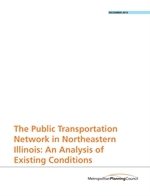The Public Transportation Network in Northeastern Illinois: An Analysis of Existing Conditions


Efficient, effective public transportation is at the heart of a competitive regional economy. With more than two million daily boardings on buses and trains operated by the region’s three major transit systems, Chicagoland has the second-most used system in the United States. Yet ridership is down about 60 percent from half a century ago, and as this report documents, the Chicago transit network must be improved significantly in order to compete with other metropolitan areas and grow the economy. Governor Pat Quinn’s announcement of a Northeastern Illinois Transit Task Force in summer 2013 offered a unique opportunity to evaluate the system’s performance.
The Metropolitan Planning Council (MPC), which has played an important role in previous debates over the role and value of transportation in the Chicago region, is contributing to this important discussion.
MPC conducted a review of existing conditions in the region from the perspective of system performance. The data and analysis included in this report provide a summary of MPC’s findings on a subset of issues, from funding and spending to system reach and ridership. Though system governance and ethics are clearly important issues that the Task Force must review, these findings suggest that other, bottom-line issues must also be addressed to make Chicago’s transit network world class.
Our primary conclusion is that the Chicagoland region underspends on transit operations and capital, both compared to its American and international competitors. Our region’s economic competitiveness will suffer as a consequence, hindering our ability to attract jobs and grow. Governance and ethics reform should improve transparency and restore public trust, in the service of increasing revenue for a better-performing transit system.
For more information on this document or transportation in general, contact Peter Skosey or Yonah Freemark.